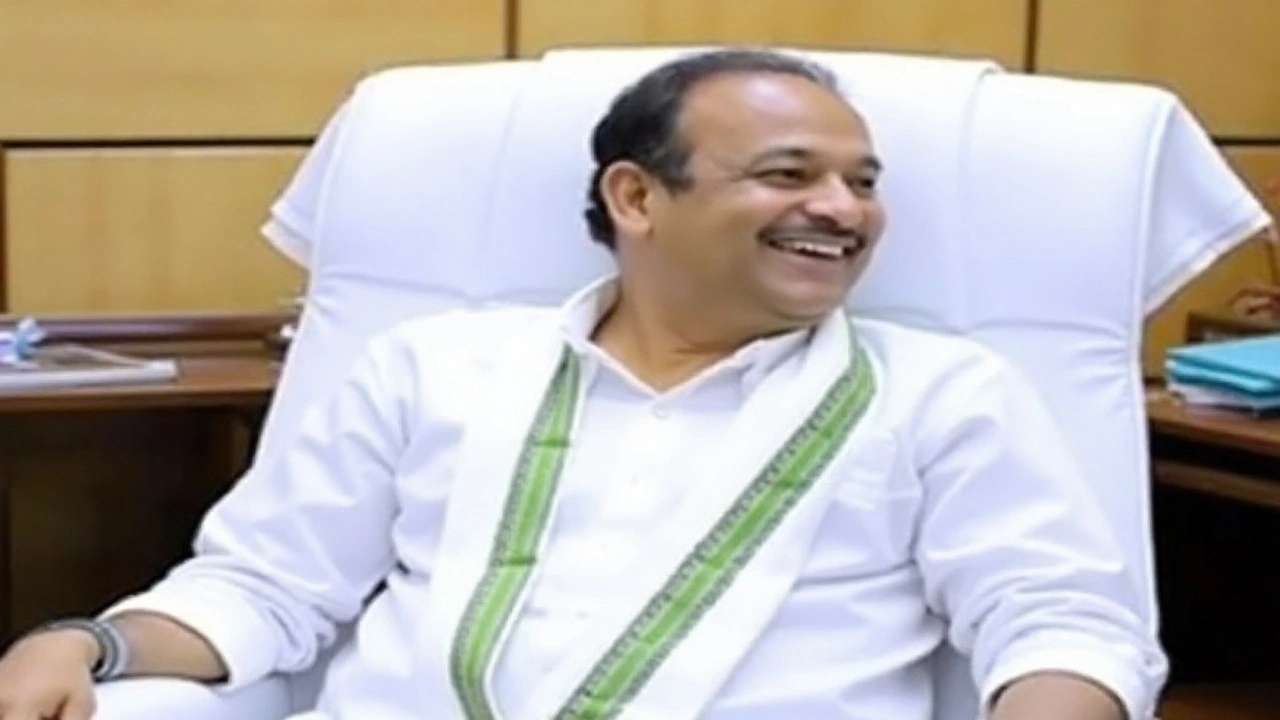
Acquittal in Dumka ends decade-old land case
A decade-old land dispute that trailed Jharkhand’s Health Minister came to an end on Thursday, 11 September 2025, when a special MP-MLA court in Dumka acquitted Irfan Ansari and his father, senior Congress leader Furkan Ansari. Sub-Divisional Judicial Magistrate Mohan Choudhary delivered the verdict after hearing arguments from both sides, citing a lack of evidence to sustain the charges. The court also took note of a mutual settlement between the parties, according to submissions made in court.
The order closes a long chapter for the Ansari family. Furkan Ansari, a former Member of Parliament and the current Congress MLA from Jamtara, had been named alongside his son in what began as a neighborhood dispute and spiraled into a criminal case. Speaking after the verdict, the health minister said, “We always had full faith in the court. I sincerely thank the court for delivering justice.” He added that his father had been dragged into the matter and said “truth has finally prevailed today.”
The dispute traces back to 2015, when Madhupur resident Maqbool Hussain filed a complaint alleging verbal abuse and physical assault during a change of ownership at a house where he was a tenant. The property had been purchased by the minister’s side, and the complaint accused the new owners of mistreating the tenant during the transition. Along with the two politicians, the case also named two others: Mustari Khatoon and Sattar Karam.
While the complaint dates to 2015, formal proceedings picked up years later. In 2022, police registered FIR No. 110/22 at the Madhupur police station, invoking a wide range of Indian Penal Code sections: 323 and 324 (causing hurt), 380 (theft), 406 (criminal breach of trust), 420 (cheating), 504 (intentional insult), 386 (extortion by putting a person in fear of death or grievous hurt), 398 (attempt to commit robbery or dacoity while armed), 452 and 453 (house-trespass), read with 34 (common intention). On paper, the charges covered everything from simple assault to serious violent crimes.
Because two of the accused were elected representatives, the matter was transferred in 2022 from the Madhupur sub-divisional court to the specialized MP-MLA court in Dumka. These courts exist to fast-track cases involving sitting and former MPs and MLAs so they are not left hanging for years. Hearings in the case stretched across multiple dates as evidence was placed on record and arguments were completed.
On Thursday, the judge said the prosecution had not met the threshold required for conviction. The court noted the insufficiency of evidence and recorded that the parties had reached a settlement. In criminal law, some offenses can be compounded—settled—if both sides agree, and for the rest, the court still needs credible proof to proceed. Without it, an acquittal follows.
Defense counsel Mohammad Raja Khan, who represented the Ansaris throughout, argued that the complaint arose out of a civil property disagreement and did not stand up as a criminal case once scrutinized in court. The defense also said the order brings legal closure for all involved. Details of the individual findings for the co-accused were not immediately available in the public domain at the time of writing.
The ruling quickly rippled through political circles in Ranchi and Dumka, where the case had become a talking point around every election cycle. For the health minister, the verdict clears a persistent legal cloud just as Jharkhand continues to push public health programs post-monsoon. There was no immediate word from the prosecution on whether an appeal would be considered.

How a tenancy fight became a courtroom battle
Disputes like this usually start small. A buyer takes possession of a house and inherits existing tenants. If the relationship sours—over rent, notice periods, repairs, or who gets to use which rooms—things can get heated. The clean way to sort it is through civil notices and, if needed, an eviction suit in a civil court. But when tempers flare, allegations of abuse or trespass can turn a civil disagreement into a criminal case, which is what happened here.
For anyone wondering what those IPC sections mean in plain language, here’s the gist: 323 and 324 deal with causing hurt (324 involves a weapon). 504 is about provoking someone with insults. 452 and 453 are serious because they involve entering someone’s home after preparing to use force. 406 and 420 cover breach of trust and cheating—usually tied to money or property promises. 380 is theft. 386 and 398 are very grave—extortion under fear of serious harm and attempting robbery while armed. Section 34 says people acted with a shared intention. Bringing so many sections into one case shows how messy these disputes can get once they escalate.
The Dumka court’s job was to look past the noise and ask: what can be proved beyond reasonable doubt? If witnesses contradict each other, documents don’t back the story, or key elements of an offense are missing, the case cannot stand. Add a settlement between the parties, and the path to acquittal becomes clear.
The legal path in this case looked like this:
- 2015: A tenant in Madhupur, Maqbool Hussain, files a complaint after the property changes hands.
- 2022: FIR No. 110/22 is registered, and the case is shifted to the MP-MLA court in Dumka because two accused are elected representatives.
- 2022–2025: Evidence is recorded, and arguments are heard.
- 11 September 2025: The court acquits Health Minister Irfan Ansari and Congress MLA Furkan Ansari, citing lack of evidence and noting a settlement.
MP-MLA courts were created to move elected representatives’ cases faster so voters are not left guessing for years. In practice, that means dedicated benches and tighter schedules. Not every case wraps up quickly, but it does reduce the backlog when courts keep hearings on track. This case took time—partly because the FIR came years after the first complaint—but it still reached a clear finish.
What does “acquitted” mean here? It means the court examined the charges and found they were not proved. It is not a technical discharge or a withdrawal; it is a full not-guilty verdict after a hearing. Could there be an appeal? Yes. The state can appeal an acquittal in a higher court, and the complainant can seek remedies allowed by law. For now, though, the order stands.
For the Ansaris, the decision removes a legal and political distraction. For people watching from Madhupur, it is a reminder of how quickly a house handover can go off the rails—and how long it can take to straighten out once it lands in criminal court. The safer route in property handovers remains the boring one: clear paperwork, formal notices to tenants, and if there is a deadlock, a civil suit rather than a police case.
As of Thursday, the Dumka MP-MLA court has said its piece. The accused walk free in this matter, and the file closes—unless an appeal reopens it. Until then, the decade-old dispute that once looked like it would drag on indefinitely has finally been put to rest inside a small courtroom in Dumka.
September 18, 2025 AT 15:32
sooo happy for the ansaris!! 😭🙏 finally some justice!! i mean like... 10 years?? for a house dispute?? bro that's wild. hope they can finally relax now and not look over their shoulder every time someone knocks. also side note: 386 and 398?? like... did they think the guy was holding a gun at the door?? 🤡
September 20, 2025 AT 14:34
Justice served! 🙌 Finally, peace after all this time!
September 21, 2025 AT 06:16
This is why we need better public education on civil vs. criminal law. People don't realize that yelling at a tenant or refusing to return a deposit isn't theft-it's a breach of contract. The police shouldn't be the first responders to housing disputes. We need more community mediation centers, not more FIRs. Also, kudos to the judge for seeing through the overcharged case. Too many courts just rubber-stamp complaints when they involve politicians, but this one actually applied the law. 🙏
September 22, 2025 AT 05:03
There's something deeply human in how this unfolded. A dispute over a house, rooted in something as simple as a misunderstanding or a bad day, spiraled into a legal quagmire because no one knew how to de-escalate. The law, in its structure, is designed to punish harm-but here, the harm was emotional, not criminal. The court recognized that. And yet, the fact that it took ten years to reach this point speaks volumes about our system's inability to handle non-violent, non-financial conflicts with nuance. Acquittal doesn't mean innocence-it means the state couldn't prove guilt beyond doubt. But truth? Truth was always in the settlement. Sometimes, peace is the only verdict that matters.
September 22, 2025 AT 15:50
Honestly, this is the kind of case that makes you appreciate the legal system when it works. Too often, we hear about politicians getting special treatment-but here, the court didn't bend over backward. They looked at the evidence, saw it was thin, and said ‘nope, not proven.’ And the settlement part? That’s actually the most mature outcome. No one won, no one lost-everyone just moved on. If more disputes ended this way, we’d have way fewer people sitting in jail over misunderstandings. Props to the judge and the defense team for keeping it grounded.
September 23, 2025 AT 09:30
The key takeaway here is jurisdictional clarity. When you have a civil property dispute involving a tenant, the proper venue is civil court not criminal. Throwing in 323 324 406 420 504 380 386 398 452 453 34 is a classic case of legal overreach-essentially trying to turn a breach of contract into a RICO case. The MP-MLA court did its job by filtering out the noise and focusing on evidentiary sufficiency. Settlements in compoundable offenses are not just procedural-they're restorative. The real failure here is the initial filing. Someone should’ve advised the complainant to file for eviction under the Rent Control Act, not escalate to extortion charges. This case is a cautionary tale for litigants and cops alike: not every angry tenant is a criminal






September 16, 2025 AT 21:08
This case is a textbook example of how civil disputes get weaponized into criminal charges. You've got a tenant-landlord disagreement that should've been handled in civil court with notices, mediation, or an eviction suit. Instead, someone threw every IPC section they could find at the accused-386, 398, 452? Come on. That's not justice, that's legal overkill. The court did the right thing by looking past the noise and focusing on what could actually be proven. Settlements aren't a cop-out; they're often the most realistic resolution when emotions have spiraled out of control. Still, it's scary how easily a property handover can turn into a decade-long nightmare. The real lesson? Paperwork matters. A signed agreement, proper notice, and calm communication could've saved everyone years of stress. This shouldn't be a headline-it should be a warning.